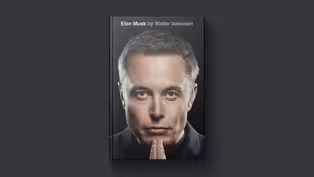
'Tyranny of the Minority' writers say democracy is at risk
Clip: 9/14/2023 | 7m 25sVideo has Closed Captions
'Tyranny of the Minority' writers say Constitution not strong enough to protect democracy
America’s democracy is in an uncharted and fragile place, according to two Harvard government professors. In their new book, “Tyranny of the Minority,” Steven Levitsky and Daniel Ziblatt say politicians are welcoming anti-democratic extremists into their party ranks and part of the problem lies in the Constitution. Laura Barrón-López spoke with the writers about how the country got to this point.
Problems playing video? | Closed Captioning Feedback
Problems playing video? | Closed Captioning Feedback
Major corporate funding for the PBS News Hour is provided by BDO, BNSF, Consumer Cellular, American Cruise Lines, and Raymond James. Funding for the PBS NewsHour Weekend is provided by...

'Tyranny of the Minority' writers say democracy is at risk
Clip: 9/14/2023 | 7m 25sVideo has Closed Captions
America’s democracy is in an uncharted and fragile place, according to two Harvard government professors. In their new book, “Tyranny of the Minority,” Steven Levitsky and Daniel Ziblatt say politicians are welcoming anti-democratic extremists into their party ranks and part of the problem lies in the Constitution. Laura Barrón-López spoke with the writers about how the country got to this point.
Problems playing video? | Closed Captioning Feedback
How to Watch PBS News Hour
PBS News Hour is available to stream on pbs.org and the free PBS App, available on iPhone, Apple TV, Android TV, Android smartphones, Amazon Fire TV, Amazon Fire Tablet, Roku, Samsung Smart TV, and Vizio.
Providing Support for PBS.org
Learn Moreabout PBS online sponsorshipAMNA NAWAZ: America's democracy is in an uncharted and fragile place, according to two Harvard government professors.
With the presidential election a little more than a year away, Laura Barron-Lopez explores the issue.
LAURA BARRON-LOPEZ: One of America's two major political parties has turned away from democracy, warn Steven Levitsky and Daniel Ziblatt.
One key accomplice to the backsliding, they say, are politicians called semi-loyalists, who, rather than expel antidemocratic extremists from their party ranks, accept and make room for them.
Why is this happening?
Their new book, "Tyranny of the Minority," concludes that part of the problem lies in the Constitution.
They join me now.
Professors, thanks so much for joining.
Steve, I want to start with you.
Can you first establish when you, as someone who is an expert in the collapse of democracies, diagnosed that there is now a popular authoritarian movement within the Republican Party?
STEVEN LEVITSKY, Co-Author, "Tyranny of the Minority: Why American Democracy Reached the Breaking Point": Well, I think there's always been authoritarian factions, authoritarian movements really within both parties historically.
What's really new is that it became a primary winning majority within the Republican Party, effectively took over the Republican Party.
So the first sign, of course, was Trump's nomination in 2016.
And we were - - the reason we wrote our first book, "How Democracies Die," is, we were so concerned about the Republican Party's failure to stop Trump.
But it's really after Trump was elected that we saw the removal, the retirement, the disappearance of non-Trumpist elements within the Republican Party and a Trumpist majority emerge within the Republican Party, so after 2016.
LAURA BARRON-LOPEZ: Daniel, I think that some news this week from Senator Mitt Romney, a Republican of Utah, speaks to what you two write about, which was that he is the only member of his party who voted twice to convict former President Donald Trump.
And in an "Atlantic" article out this week, Romney said: "A very large portion of my party really doesn't believe in the Constitution."
Daniel, do you see Senator Romney's retirement as a sign that, rather than weed out the extremists in their party, Republicans are weeding out moderate Republicans like Romney and Liz Cheney?
DANIEL ZIBLATT, Co-Author, "Tyranny of the Minority: Why American Democracy Reached the Breaking Point": Yes.
Yes, it's concerning.
To be a party committed to democracy, you have to do three very simple things.
Number one, you have to accept election losses, win or lose.
Number two, you have to not use violence to gain or to hold onto power.
And then, number three, most critically, in some sense, for mainstream political parties is, you have to distance yourself and be explicit and open about condemning anybody who's an ally of your party that commits any of those first two types of acts.
To be a party committed to democracy, in order for democracy to survive, the political parties in a political system have to ascribe to all three of those principles.
This applies to parties of the right and of the left.
And I think what is so concerning, as Steve described, is that over the last four years, we have seen a process of decay within the Republican Party where all three of those principles are violated, but, in particular, most recently among mainstream members of the Senate.
And this is what Mitt Romney's description provides us an account of, a violation of that third principle, people who essentially knew what was happening on January 6 and did very little to stop it.
LAURA BARRON-LOPEZ: So, Steve, when you're talking about semi-loyal small-D democrats, who exactly do you see as those actors that are eroding democracy?
STEVEN LEVITSKY: So, semi-loyal democrats are tricky, because they look like regular politicians.
They look like mainstream politicians.
They are, in fact, mainstream politicians.
They are in the halls of Congress.
They are wearing suits.
They look and talk and act like regular small-D democrats.
But the key difference is their willingness to tolerate, to condone, to justify, sometimes to protect antidemocratic extremists.
And we have seen throughout history that when mainstream politicians of the left or the right tolerate, condone, protect extremists on the right or the left, democracies get into trouble.
And so who are we talking about in the Republican Party today?
Mainstream Republican Party leaders, Kevin McCarthy, Mitch McConnell, leading senators, leading governors.
LAURA BARRON-LOPEZ: Daniel, you have said that America won't necessarily become nationally like a country like Hungary, but that states across America could potentially model the autocracy in Hungary.
DANIEL ZIBLATT: Yes, so we live in a federal system.
We have a system of checks and balances.
And so for all of the troubles that are - - that face American democracy today, one big difference between the United States and a country like Hungary or other countries where democratic backsliding has really established single-party rule, we have constraints and there's a strong opposition to these forces.
That's certainly the case at the national level.
What's so striking, though, because we have a federal system, that there are states in the United States where there are assaults on voting rights taking place, where there's extreme levels of gerrymandering, so that it makes it possible for a party that doesn't win the most votes to actually win control of state legislatures, where courts are then packed at the local -- at the state level as well.
So what we see across the United States is increasingly a divide between states where you continue to have voting rights and democracy and states where democracy is really under assault.
LAURA BARRON-LOPEZ: Daniel, your book warns that the Constitution, which is the world's oldest written constitution, is part of the problem, is part of what's imperiling democracy.
So what changes do you think need to be made?
DANIEL ZIBLATT: Some of the things that we discussed in the book and we propose, we have a 15-point set of suggestions in our last chapter, including things such as eliminating the Electoral College -- we're the only democracy in the world within Electoral College -- introducing term limits and retirement ages for the Supreme Court.
We're the only democracy in the world that doesn't have retirement ages or term limits for national judges.
We also propose some reforms that don't require constitutional reforms, such as eliminating or at least weakening the filibuster, the filibuster in the United States, since we're the only democracy in the world that has such a strong tool of obstruction in one of our chambers of Congress.
This tool of obstruction blocks very often majority-supported policies, gun control, efforts to address climate change, the minimum wage.
Things get held up in the national Congress, which frustrates citizens.
So we think there needs to be a kind of a sweeping reform agenda.
And one of the things we have discovered looking at other democracies, I should add, is that, when constitutional reforms come, they tend to cluster together.
Momentum is gained.
People get -- regain faith in their political system.
And we think this is very much part of the American tradition.
Where we are operating today without this is outside of the American tradition.
And this is something we need to get back to.
LAURA BARRON-LOPEZ: Steven Levitsky and Daniel Ziblatt of Harvard University, thank you so much for your time.
STEVEN LEVITSKY: Thank you.
Biographer Walter Isaacson on what motivates Elon Musk
Video has Closed Captions
Clip: 9/14/2023 | 8m 36s | Walter Isaacson on his Elon Musk biography and what motivates the controversial tech CEO (8m 36s)
Flooding sparks scrutiny of Libya's divided government
Video has Closed Captions
Clip: 9/14/2023 | 4m 43s | Catastrophic flooding sparks renewed scrutiny of Libya's divided government (4m 43s)
New drone tech could help clear unexploded mines in Ukraine
Video has Closed Captions
Clip: 9/14/2023 | 8m 28s | New drone technology could make it easier to clear unexploded bombs, mines in Ukraine (8m 28s)
Regional theaters fight to save historic art form
Video has Closed Captions
Clip: 9/14/2023 | 8m 34s | A look at the regional theaters fighting to save their historic art form (8m 34s)
What led to Hunter Biden's indictment on firearms charges
Video has Closed Captions
Clip: 9/14/2023 | 4m 48s | hat led to Hunter Biden's indictment on firearms charges and the legal battle ahead (4m 48s)
What led to the rat boom and how cities are responding
Video has Closed Captions
Clip: 9/14/2023 | 5m 4s | What led to the rat population boom and how cities are responding (5m 4s)
Providing Support for PBS.org
Learn Moreabout PBS online sponsorship
- News and Public Affairs

FRONTLINE is investigative journalism that questions, explains and changes our world.

- News and Public Affairs

Amanpour and Company features conversations with leaders and decision makers.












Support for PBS provided by:
Major corporate funding for the PBS News Hour is provided by BDO, BNSF, Consumer Cellular, American Cruise Lines, and Raymond James. Funding for the PBS NewsHour Weekend is provided by...





